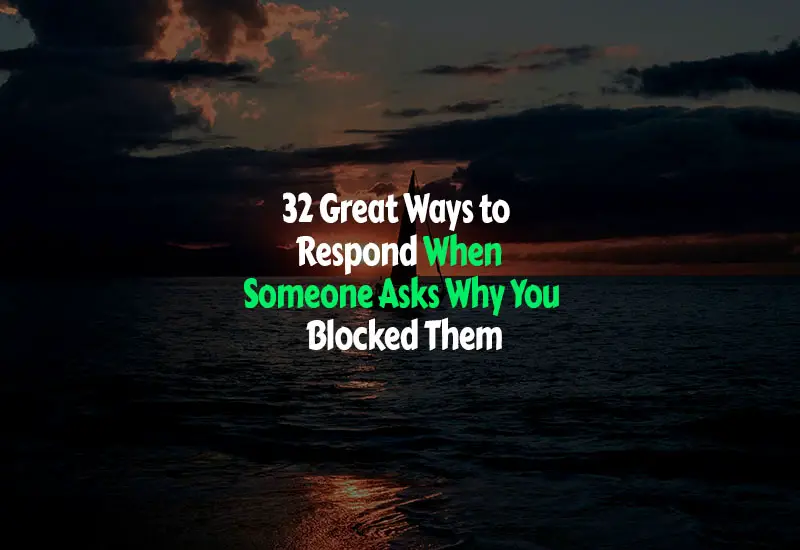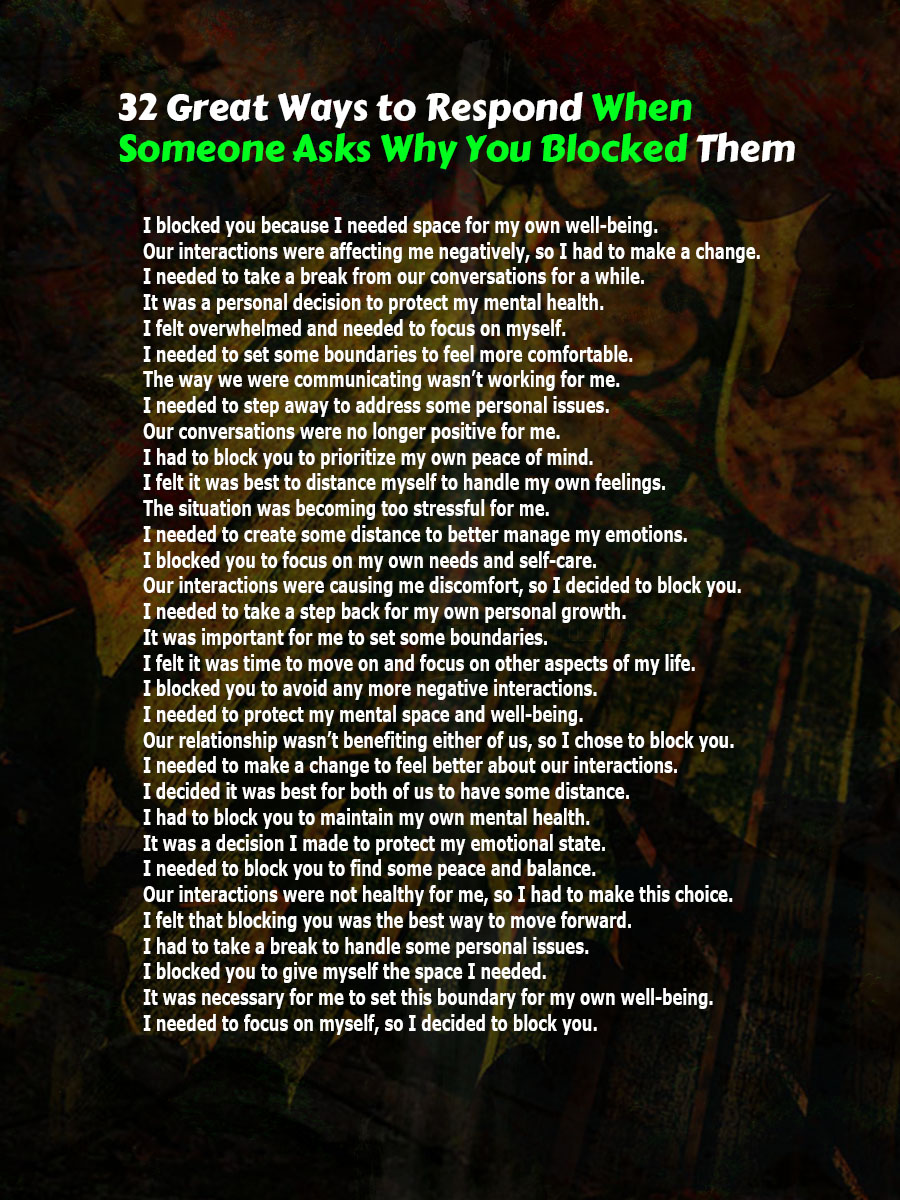When confronted about blocking someone, it’s best to be honest, empathetic, and assertive. We will discuss effective ways to respond when faced with questions or accusations about blocking someone on social media or any other platform.
Blocking someone can be a personal decision that might require boundaries or self-care, but it’s important to communicate your perspective respectfully and assertively. By following these tips, you can address the situation with maturity and minimize potential conflicts. So, let’s explore some effective strategies to respond when confronted about blocking someone.

Here are 32 Great Ways to Respond When Someone Asks Why You Blocked Them:
- I blocked you because I needed space for my own well-being.
- Our interactions were affecting me negatively, so I had to make a change.
- I needed to take a break from our conversations for a while.
- It was a personal decision to protect my mental health.
- I felt overwhelmed and needed to focus on myself.
- I needed to set some boundaries to feel more comfortable.
- The way we were communicating wasn't working for me.
- I needed to step away to address some personal issues.
- Our conversations were no longer positive for me.
- I had to block you to prioritize my own peace of mind.
- I felt it was best to distance myself to handle my own feelings.
- The situation was becoming too stressful for me.
- I needed to create some distance to better manage my emotions.
- I blocked you to focus on my own needs and self-care.
- Our interactions were causing me discomfort, so I decided to block you.
- I needed to take a step back for my own personal growth.
- It was important for me to set some boundaries.
- I felt it was time to move on and focus on other aspects of my life.
- I blocked you to avoid any more negative interactions.
- I needed to protect my mental space and well-being.
- Our relationship wasn't benefiting either of us, so I chose to block you.
- I needed to make a change to feel better about our interactions.
- I decided it was best for both of us to have some distance.
- I had to block you to maintain my own mental health.
- It was a decision I made to protect my emotional state.
- I needed to block you to find some peace and balance.
- Our interactions were not healthy for me, so I had to make this choice.
- I felt that blocking you was the best way to move forward.
- I had to take a break to handle some personal issues.
- I blocked you to give myself the space I needed.
- It was necessary for me to set this boundary for my own well-being.
- I needed to focus on myself, so I decided to block you.
See Also: 28 Great Ways to Respond to "Haven't Heard from You in a While"
Understanding The Situation
When someone confronts you about blocking them, it’s essential to understand the situation before responding. Assessing the context and reviewing the interaction can help you handle the situation effectively.
Assess The Context
Before responding, consider the circumstances that led to the block. Take into account why you chose to block the individual in the first place and the impact it may have had on them.
Review The Interaction
Reflect on the interaction that occurred before the block. Was there a misunderstanding or conflict that could have been handled differently? Understanding the exchange can provide insight into the confrontation.
Effective Communication
Effective communication is key when dealing with difficult conversations, especially when confronted about blocking someone. Maintaining composure and expressing empathy and understanding are crucial in navigating these challenging interactions.
Stay Calm And Collected
It’s important to remain composed when confronted about blocking someone. Take a deep breath and refrain from reacting impulsively. Approach the conversation with a calm demeanor, which can help diffuse tension and facilitate a more productive dialogue.
Express Empathy And Understanding
Show empathy towards the individual who feels hurt or upset about being blocked. Use phrases like “I understand how you must feel” or “I acknowledge that this situation is difficult for you”. This can help validate their emotions and demonstrate that you are willing to listen and understand their perspective.
By employing these strategies, individuals can effectively navigate conversations around being confronted about blocking someone, fostering understanding and promoting healthy communication dynamics.
Apologize And Clarify
When you find yourself confronted about blocking someone, it’s important to handle the situation with empathy and understanding. One effective approach is to offer a sincere apology and clarify your perspective. By doing so, you can address any misunderstandings or unintended consequences that may have resulted from blocking the individual.
Offer A Sincere Apology
Start by acknowledging the impact of your action and express a genuine apology. Take responsibility for any hurt feelings or frustrations that the person may have experienced as a result of being blocked. Offering a sincere apology shows that you value their feelings and are willing to listen and understand their perspective.
For example, you could say:
“I sincerely apologize for blocking you. I understand that it may have caused confusion or hurt, and I genuinely regret any pain caused.”
Explain Your Perspective
Once you have offered your apology, it’s important to explain your perspective and the reasons behind your decision to block someone. This helps to provide clarity and encourages open and honest communication. Be respectful and use clear and concise language to ensure your explanation is easily understood.
You can use a bullet-point or ordered list to summarize your points, like this:
- Privacy concerns: Explain that you blocked the person to protect your own privacy or mental well-being.
- Harassment or abusive behavior: Clarify if the person’s conduct crossed boundaries or became inappropriate, leading to the decision to block them.
- Miscommunication or misunderstanding: Address any possible misunderstandings or miscommunications that led to the blocking.
By explaining your perspective, you demonstrate your willingness to engage in a respectful and constructive conversation. It also helps the other person understand your intentions and may foster understanding and potential resolution.
Remember, when responding to someone about blocking them, always maintain a respectful and open attitude, even if their initial approach was confrontational or aggressive. By offering a sincere apology and clarifying your perspective, you can strive towards a positive resolution.
Setting Boundaries
When it comes to blocking someone, it’s important to establish clear boundaries. Setting boundaries allows you to communicate your needs and expectations, ensuring that both parties can understand and respect each other’s limits. Here are a few ways to respond when confronted about blocking someone.
Communicate Your Boundaries Clearly
Sometimes, people may not understand why you chose to block them. In such situations, it becomes essential to communicate your boundaries clearly. By expressing your reasons for blocking and explaining how their behavior or actions crossed a line, you can help the other person understand why you made that decision.
Here are a few key points to keep in mind when communicating your boundaries:
- Be honest and direct about how their actions affected you.
- Use “I” statements to express your feelings without placing blame.
- Avoid generalizations and stick to specific examples of behavior that led to the block.
Seek Mutual Understanding
When confronted about blocking someone, it’s essential to seek mutual understanding. Take the time to listen to their perspective and try to see things from their point of view. This doesn’t mean you have to agree with them or change your decision, but maintaining open communication can help foster empathy and potentially resolve any misunderstandings.
Here are a few ways to seek mutual understanding:
- Show empathy by actively listening to their concerns.
- Reiterate your boundaries and explain why they’re important to you.
- Suggest alternative methods of communication or compromises that could work for both parties.
Remember, setting boundaries is vital for maintaining your peace of mind and emotional well-being. By communicating your boundaries clearly and seeking mutual understanding, you can navigate these situations with respect and empathy.
See Also: 30 Best Ways to Ask Someone to Talk on the Phone
Moving Forward
When faced with a situation where you’ve had to block someone, it’s essential to find ways to move forward positively. This can be a delicate process, and finding common ground and agreeing on next steps can help pave the way for a smooth resolution. By using these approaches, you can navigate through the confrontation of blocking someone with grace and understanding.
Find Common Ground
It’s crucial to establish a common understanding when confronted about blocking someone. Express the desire to resolve any conflict and find common ground. Acknowledge the feelings of the other person and emphasize empathy in your response. Avoid confrontation and aim to find an amicable solution.
Agree On Next Steps
Once common ground has been identified, it’s time to agree on next steps. Discuss the best way to move forward, whether it’s maintaining distance or finding a compromise. Open communication and respectful dialogue are key in this stage. Ensure that both parties are clear on the agreed-upon actions to prevent any misunderstandings.

More Additional Responses
- The way things were going wasn't healthy for me.
- I needed a break to focus on my own mental health.
- I decided it was best to step away for a while.
- Our interactions were causing me too much stress.
- I needed to take time to heal and reflect.
- Blocking you was a way for me to protect my well-being.
- I felt it was the right move to take care of myself.
- I needed to set this boundary to feel more at ease.
- I felt overwhelmed and needed some distance.
- Our conversations were no longer positive for me.
- I needed to block you to avoid further conflict.
- I was finding it hard to manage our interactions, so I had to block you.
- I needed to focus on my own life without distractions.
- I decided to block you to create a healthier environment for myself.
- I needed to prioritize my own feelings and well-being.
- The situation was too difficult for me to handle, so I blocked you.
- I had to block you to create a healthier space for myself.
- I felt it was necessary for my own peace of mind.
- I needed to block you to take care of my own emotional needs.
- It was a decision made for my personal growth and comfort.
- I blocked you to give myself the time and space I need to move forward.
See Also: 26 Great Ways to Respond When Someone Brings Up Your Past
Conclusion
In handling confrontations about blocking someone, it’s essential to approach the situation with empathy. Communicate openly and honestly about your decision, while also respecting the other person’s feelings. Remember that setting boundaries is important for your well-being. By staying calm and assertive, you can navigate these challenging conversations with grace and maturity.









